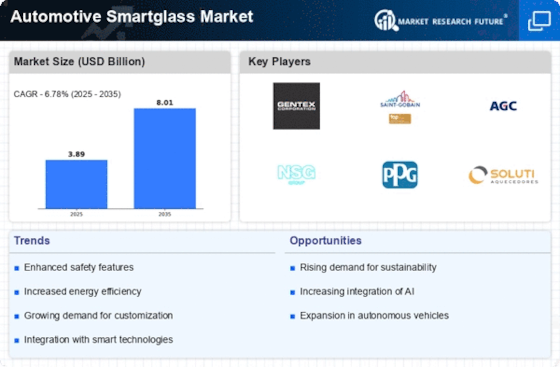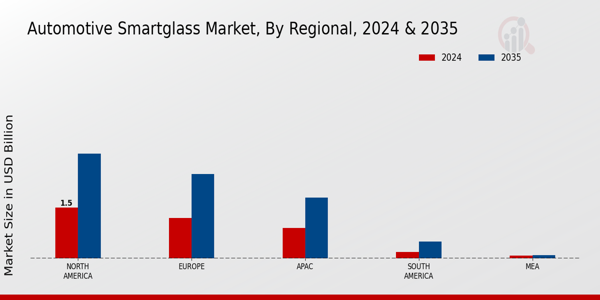Market Growth Projections
Technological Advancements
The Global Automotive Smartglass Market Industry is experiencing rapid technological advancements that enhance the functionality and appeal of smartglass products. Innovations such as electrochromic and photochromic technologies allow for dynamic tinting, improving passenger comfort and energy efficiency. For instance, manufacturers are integrating smartglass with heads-up displays, providing real-time information to drivers without obstructing their view. This trend is likely to drive market growth, as consumers increasingly seek vehicles equipped with cutting-edge features. The market is projected to reach 3.89 USD Billion in 2024, indicating a robust demand for technologically advanced automotive solutions.
Rising Demand for Luxury Vehicles
The Global Automotive Smartglass Market Industry is significantly influenced by the rising demand for luxury vehicles, which often incorporate advanced smartglass technologies. High-end manufacturers are increasingly adopting smartglass to enhance aesthetics and provide unique features such as panoramic roofs and privacy glass. This trend is evident in brands like Mercedes-Benz and BMW, which offer models equipped with smartglass options. As the luxury vehicle segment continues to expand, the market for automotive smartglass is expected to grow correspondingly. By 2035, the market could reach 8 USD Billion, reflecting the increasing consumer preference for premium automotive experiences.
Consumer Awareness and Preferences
Consumer awareness regarding the benefits of smartglass technologies is rising, which is positively influencing the Global Automotive Smartglass Market Industry. As consumers become more informed about the advantages of smartglass, such as enhanced comfort, safety, and aesthetic appeal, their preferences are shifting towards vehicles equipped with these features. Marketing campaigns highlighting the benefits of smartglass are becoming more prevalent, further driving consumer interest. This heightened awareness is likely to contribute to the market's growth trajectory, as manufacturers respond to evolving consumer demands by integrating smartglass into their vehicle offerings.
Regulatory Support for Safety Features
Regulatory frameworks worldwide are increasingly emphasizing safety features in vehicles, which is positively impacting the Global Automotive Smartglass Market Industry. Governments are mandating the inclusion of advanced safety technologies, including smartglass that enhances visibility and reduces glare. For example, the European Union has implemented regulations that encourage the use of smartglass in commercial vehicles to improve driver awareness. This regulatory support is likely to drive adoption rates, as manufacturers seek to comply with safety standards while enhancing vehicle performance. Consequently, the market is expected to grow at a CAGR of 6.77% from 2025 to 2035.
Sustainability and Eco-Friendly Solutions
The Global Automotive Smartglass Market Industry is increasingly aligned with sustainability trends, as manufacturers seek eco-friendly solutions to meet consumer demands. Smartglass technologies contribute to energy efficiency by reducing the need for air conditioning and improving thermal insulation. This is particularly relevant in electric vehicles, where energy conservation is paramount. Companies are investing in research to develop recyclable smartglass materials, further enhancing their environmental credentials. As sustainability becomes a key purchasing factor for consumers, the market for automotive smartglass is poised for growth, with projections indicating a substantial increase in market value over the next decade.












